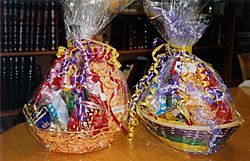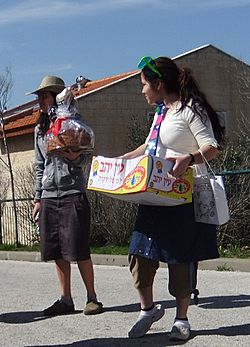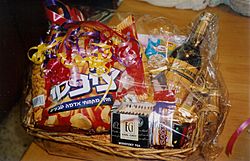Mishloach manot facts for kids
Mishloach manot (which means "sending of portions" in Hebrew) is also known as a Purim basket. These are gifts of food or drink that people send to family, friends, and others on the Jewish holiday of Purim.
The idea of giving mishloach manot comes from the Book of Esther in the Bible. It helps make sure everyone has enough food for the big Purim feast later in the day. It also helps people show love and friendship to each other.
According to Jewish law, called halakha, every Jewish person who is old enough (after their Bar and Bat Mitzvah) should send a food gift. This gift must have at least two different types of food. It should go to at least one person. Sending these gifts is a very important part of Purim celebrations.
In Israel, it's common to send mishloach manot to IDF soldiers. Their families often send them, and kids also like to send baskets to soldiers they don't even know.
Contents
Rules for Giving Mishloach Manot
Here are some important rules about giving mishloach manot:
- You must send and deliver mishloach manot during the daytime on Purim.
- The person sending and the person receiving should be celebrating Purim on the same day.
- Kids over the age of six or seven are also encouraged to send mishloach manot. This helps them learn about doing a mitzvah (a good deed or commandment).
- You should not send mishloach manot to someone who is in mourning. However, a person who is mourning still needs to send mishloach manot to others. Their gift should not be too fancy. Some people say a mourner should only send to one person.
- You can deliver the gifts yourself, but it's common to send them through another person. Kids often help deliver these food packages. They might get sweets as a thank you for their help!
- You don't have to send mishloach manot back to someone who sent them to you.
- Jewish law only asks you to give two food items to one friend. But it's good to give mishloach manot to more people if you can. However, it's even better to give more money to charity on Purim than to spend a lot on fancy mishloach manot.
What Foods to Include?
Mishloach manot can include any food or drink that is ready to eat or drink. Water is the only exception. For example, a bottle of soda or a bag of chips works. But raw meat or uncooked grains do not count.
Purim baskets often have wine and pastries, especially hamentashen. You can also send cooked dishes, canned foods, salads, snacks, sweets, and fruits. You need to send two different types of food. For example, you can send an apple and an orange. But you cannot send two of the same fruit, like two apples.
The amount of food in each mishloach manot package should fit the person giving and the person receiving. A wealthy person should send a nicer package than a poor person. Also, you should send a nicer gift to a wealthy person than to a poor person.
Some Jewish teachers say the foods should be good for the Purim meal later in the day. Others say the main goal is to "increase peace and friendship." So, sending things like candy or pretzels is fine too.
Mishloach Manot for Charity
Many Jewish groups and schools use mishloach manot to help raise money. They run "Mishloach Manot Fundraisers." They help send food baskets to their members. A card comes with the basket, listing the names of other members who helped pay for the gift.
Each member gives a list of people they want to send to. They pay a fee for each name. This helps the organization earn a small profit. This way, people can send gifts to many friends without having to buy, wrap, and deliver them all themselves.
Other charity groups collect donations. In return, they send the donor cards to give to their friends. For example, if you donate £10, you might get three cards. If you donate £20, you might get six. Donors sign and mail these cards. The cards say, "Instead of mishloach manot, a donation has been made in your name to [organization name]." While this doesn't count as fulfilling the mishloach manot mitzvah, many people use it. It's a good way to show kindness to many people they know.
See also
 In Spanish: Mishloach manot para niños
In Spanish: Mishloach manot para niños
 | Dorothy Vaughan |
 | Charles Henry Turner |
 | Hildrus Poindexter |
 | Henry Cecil McBay |




